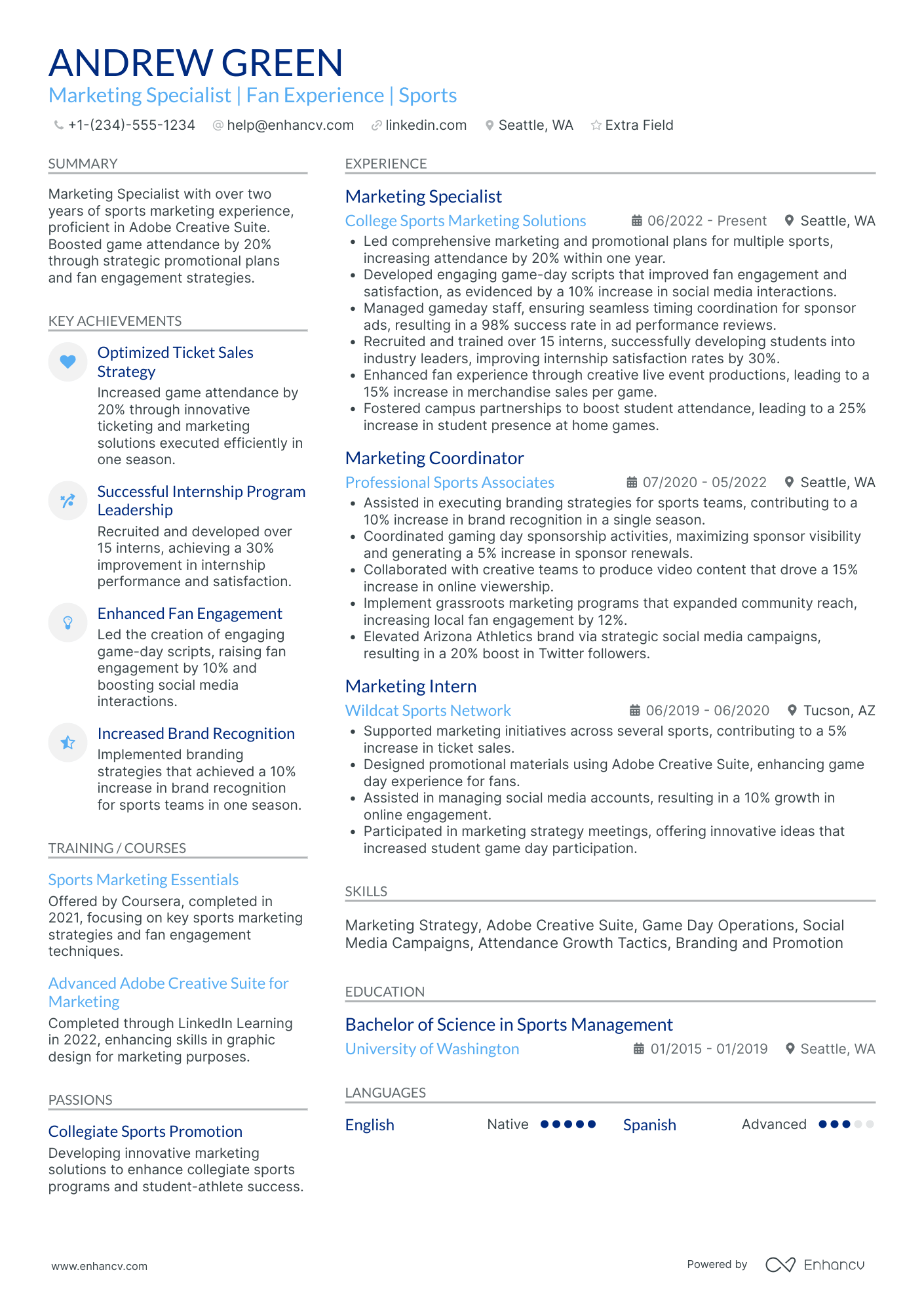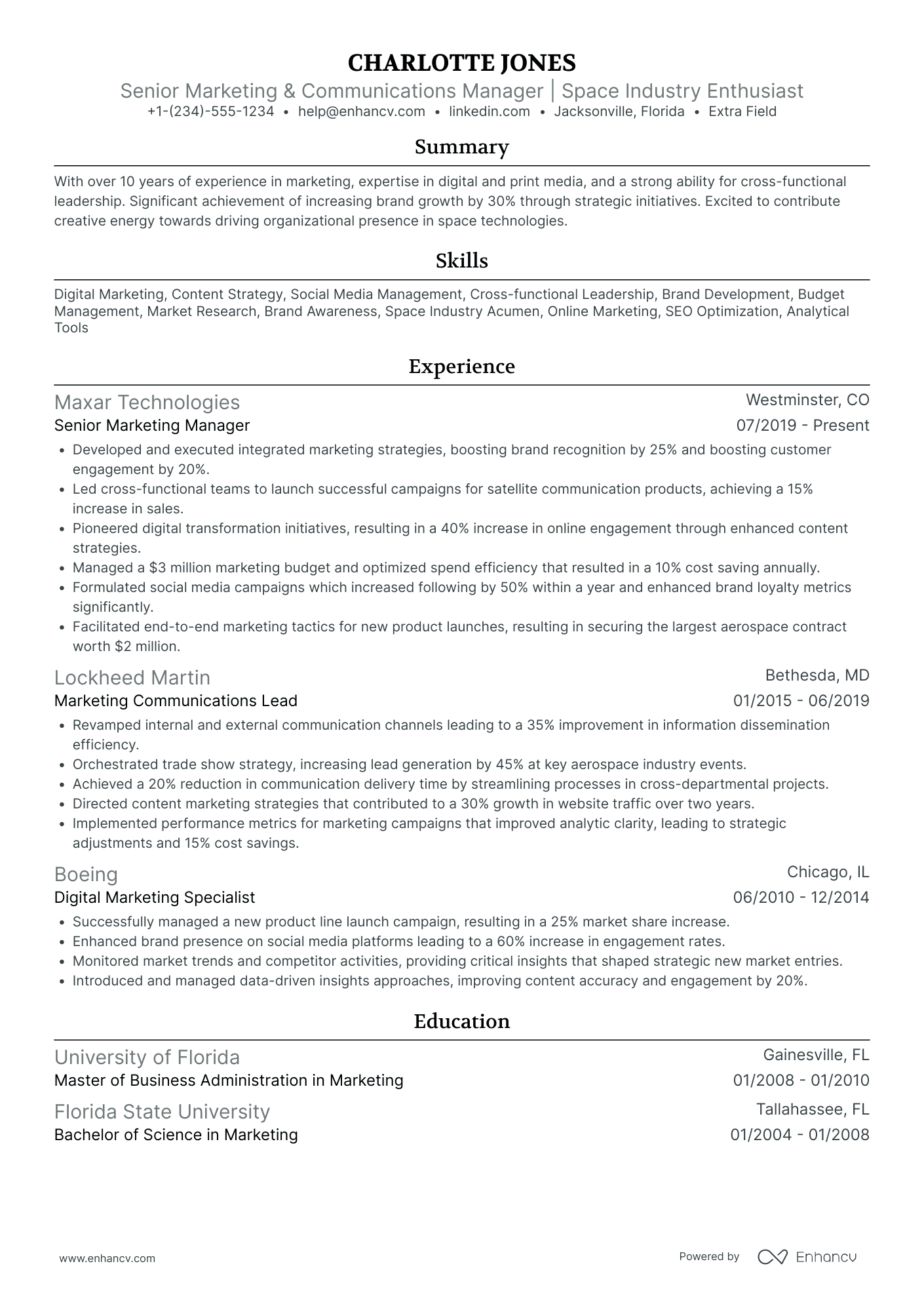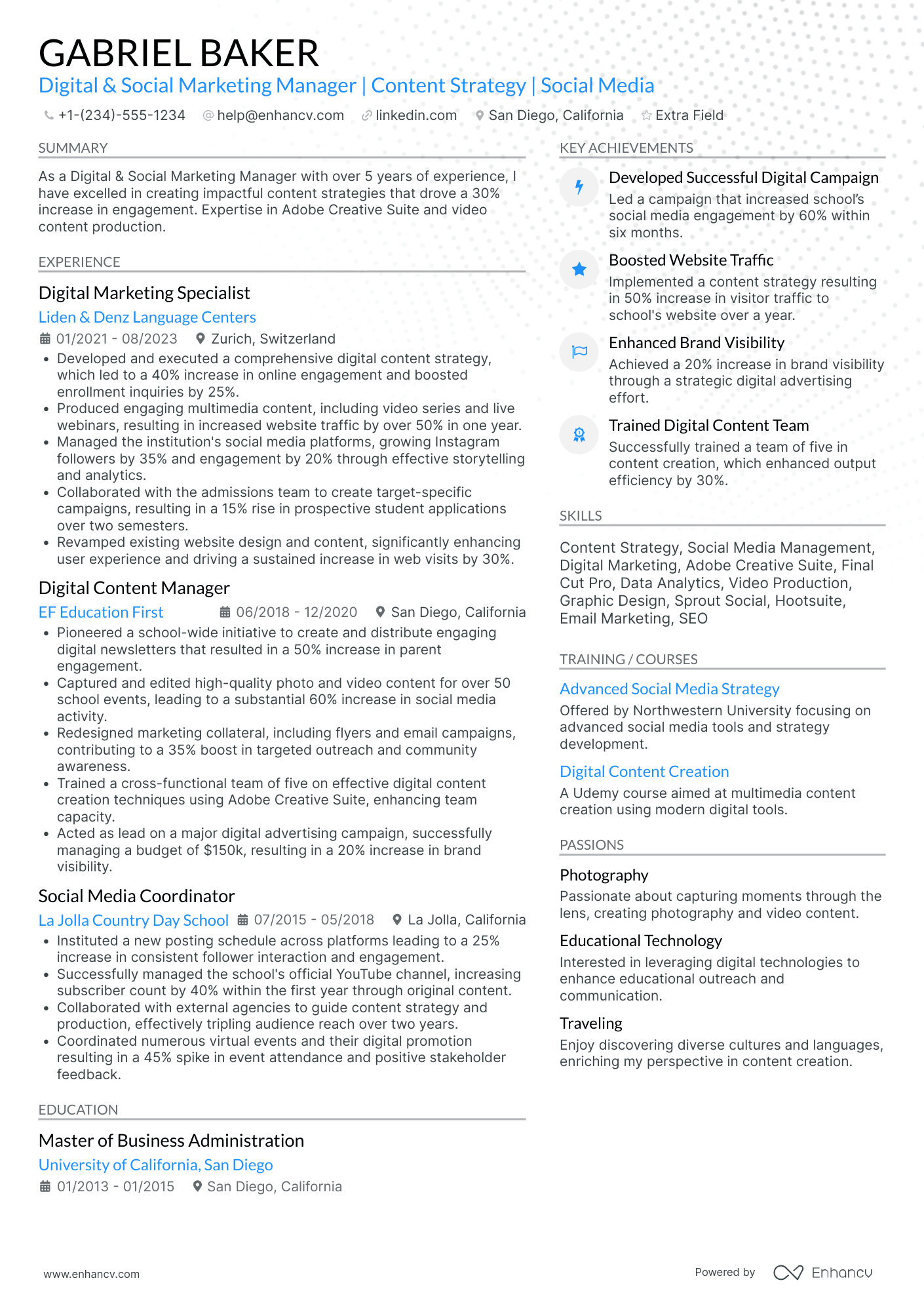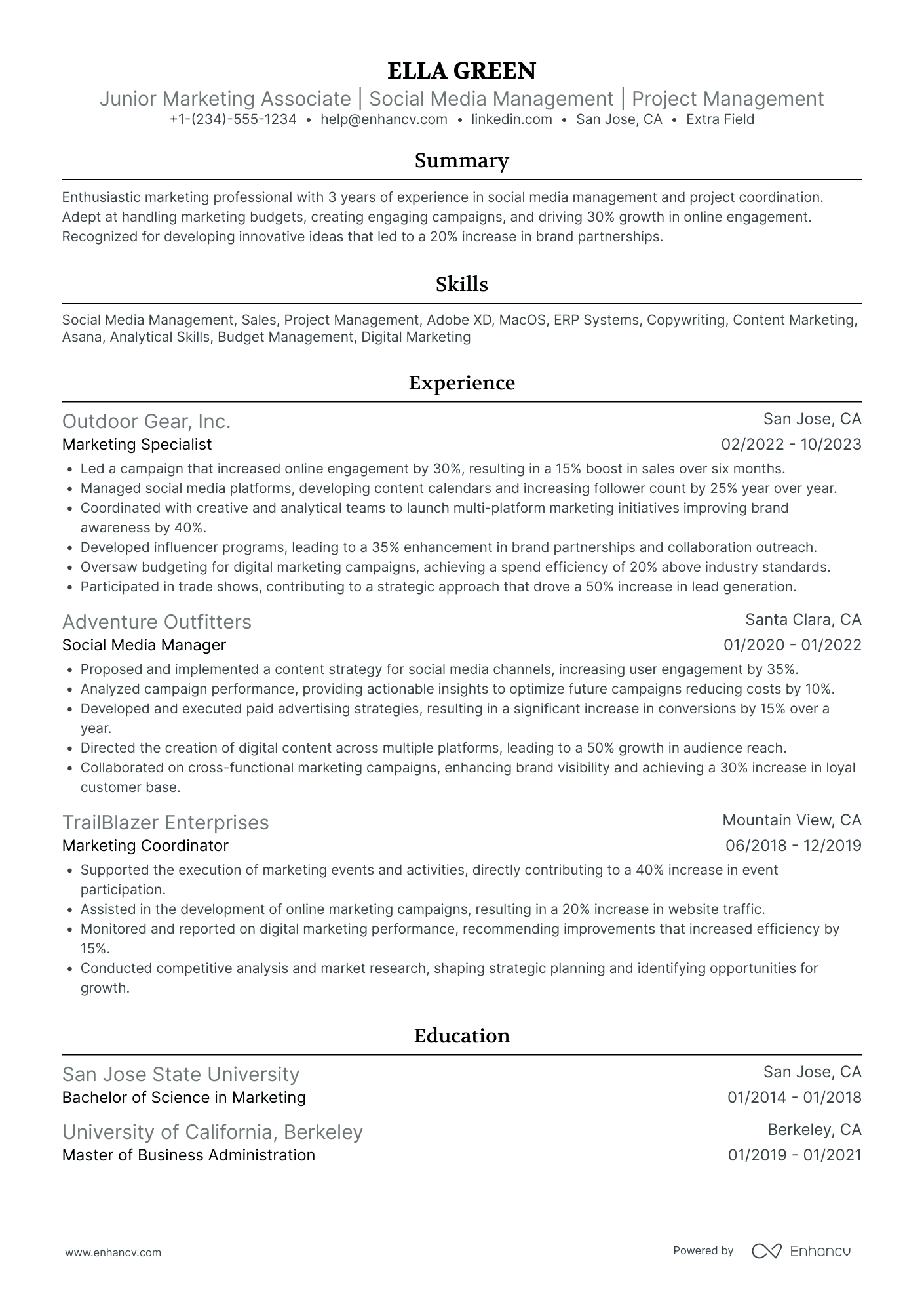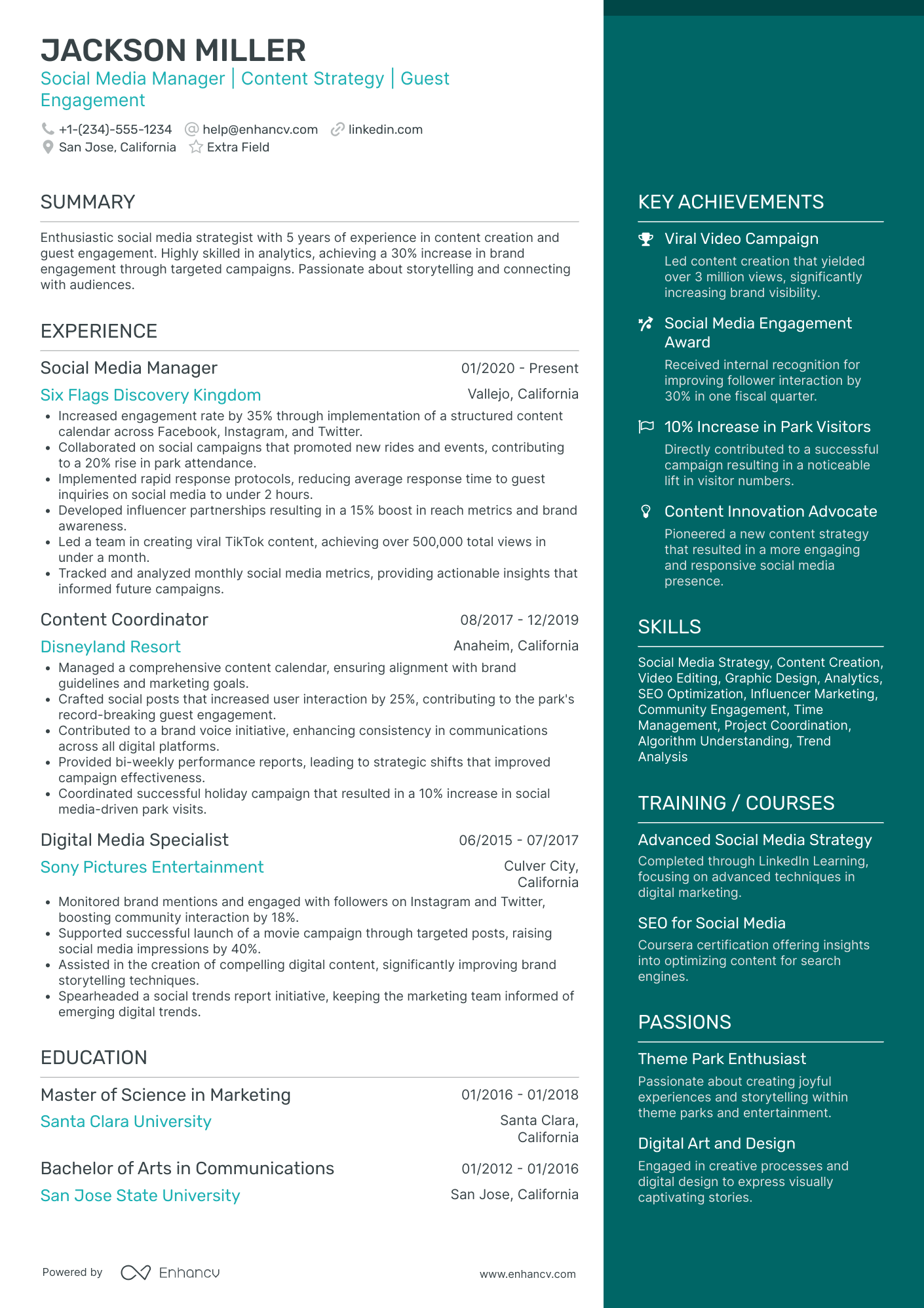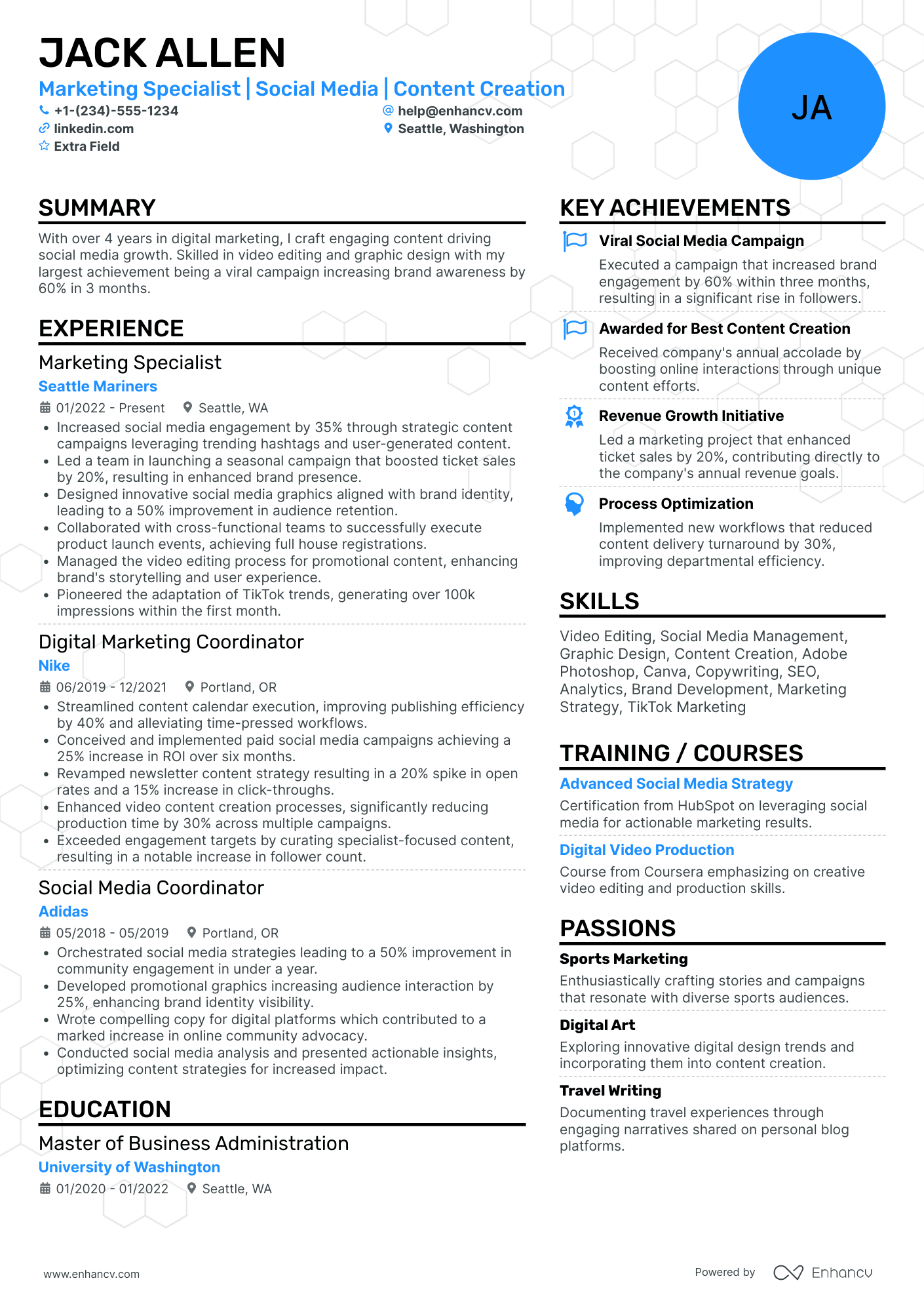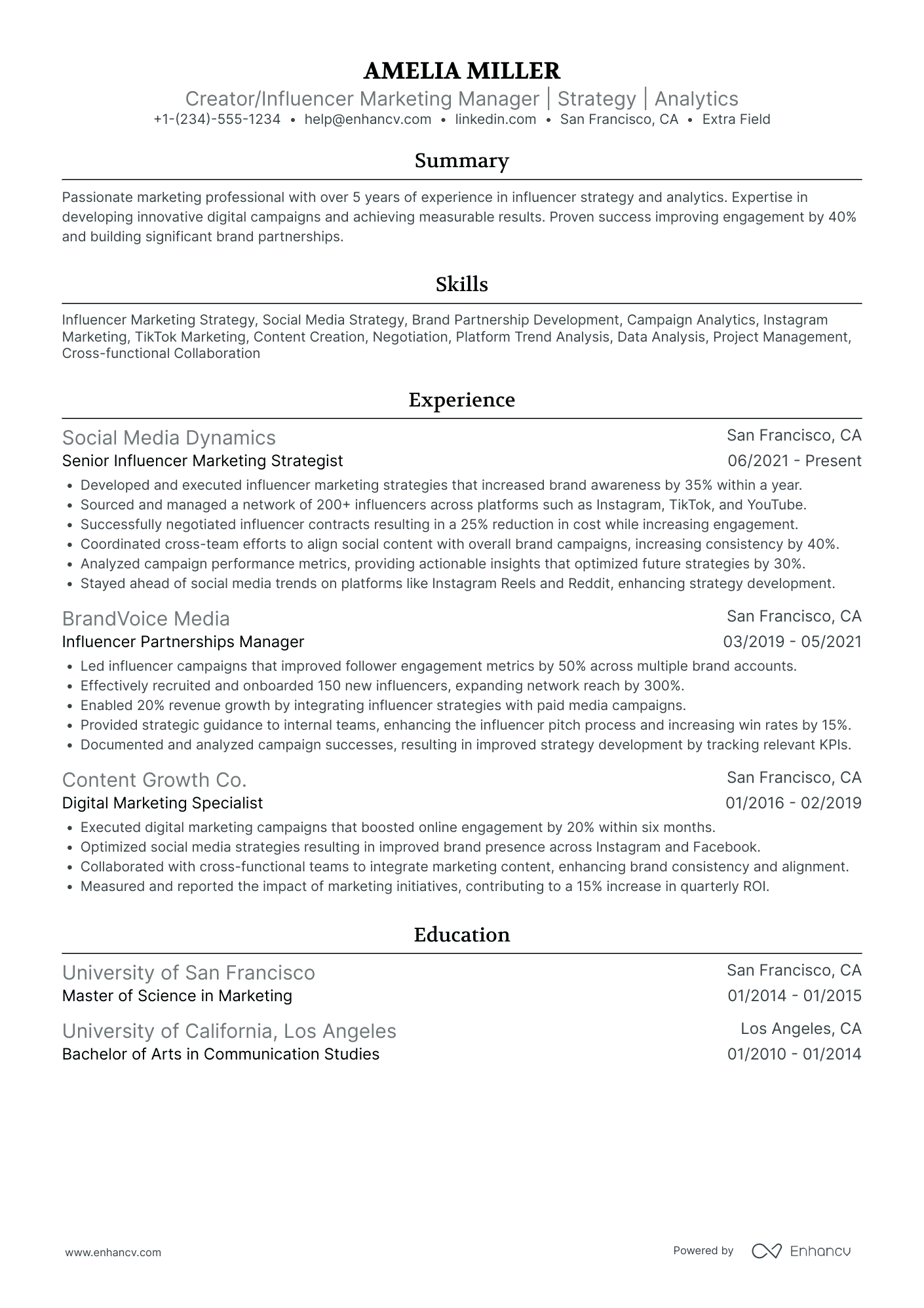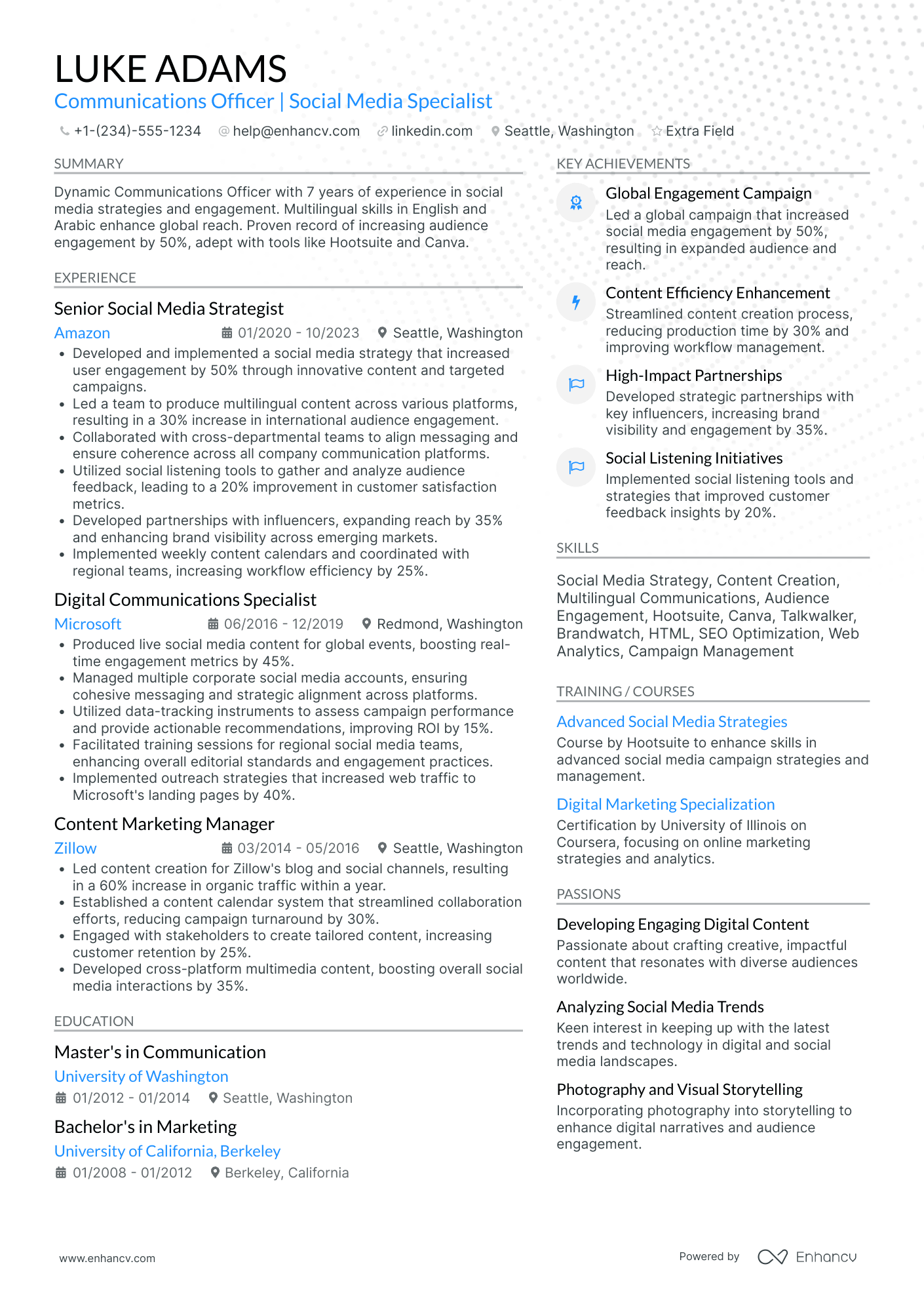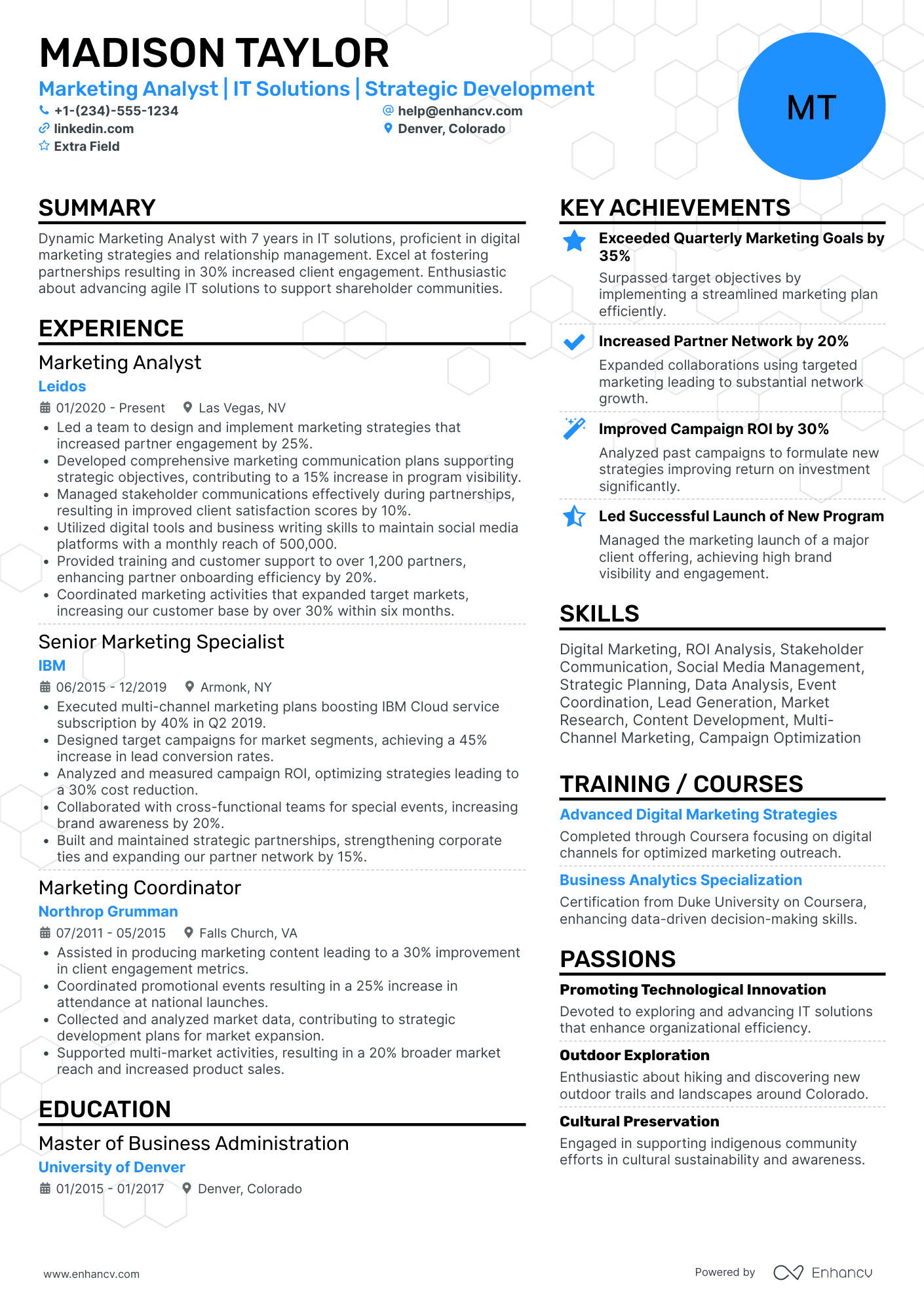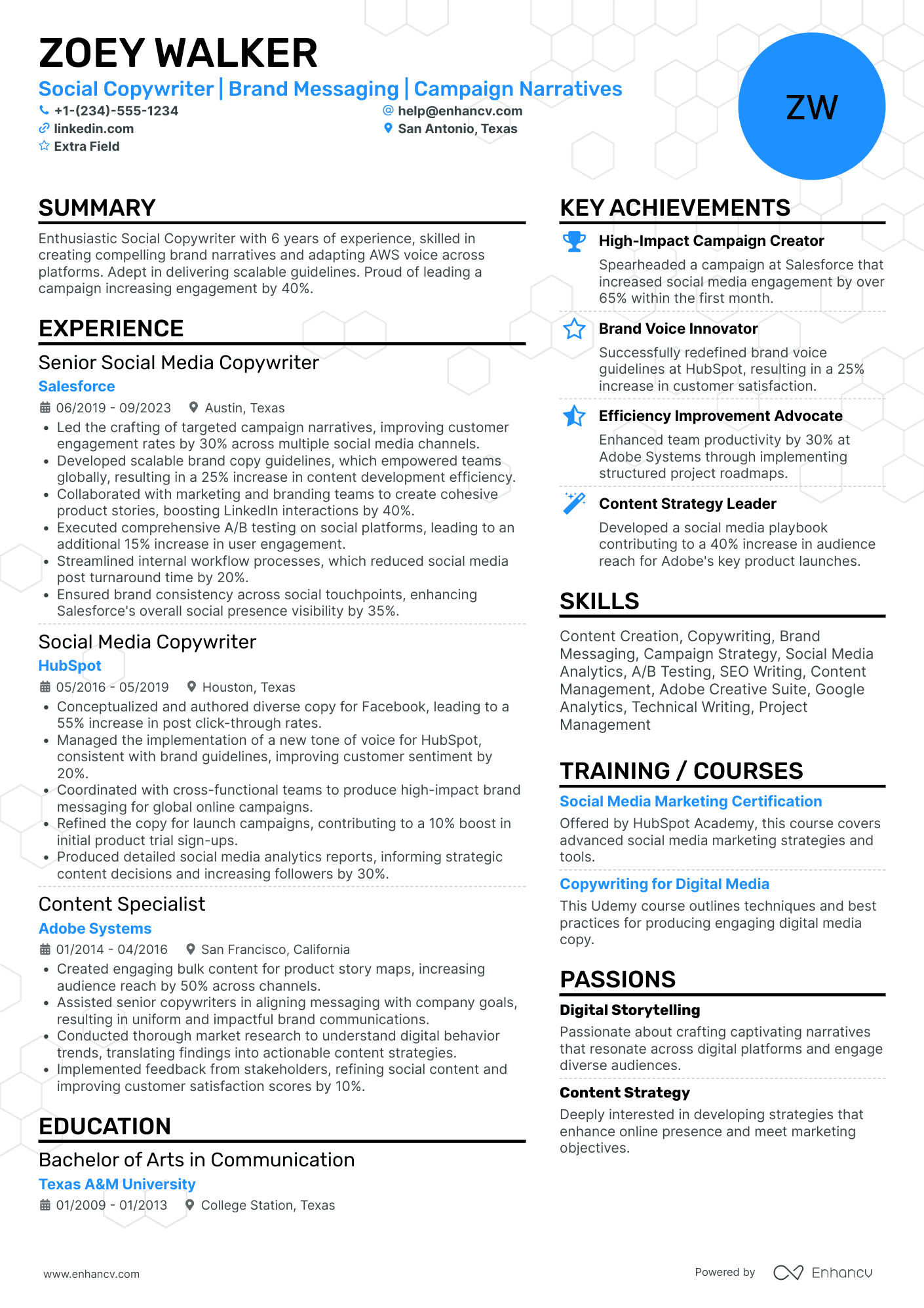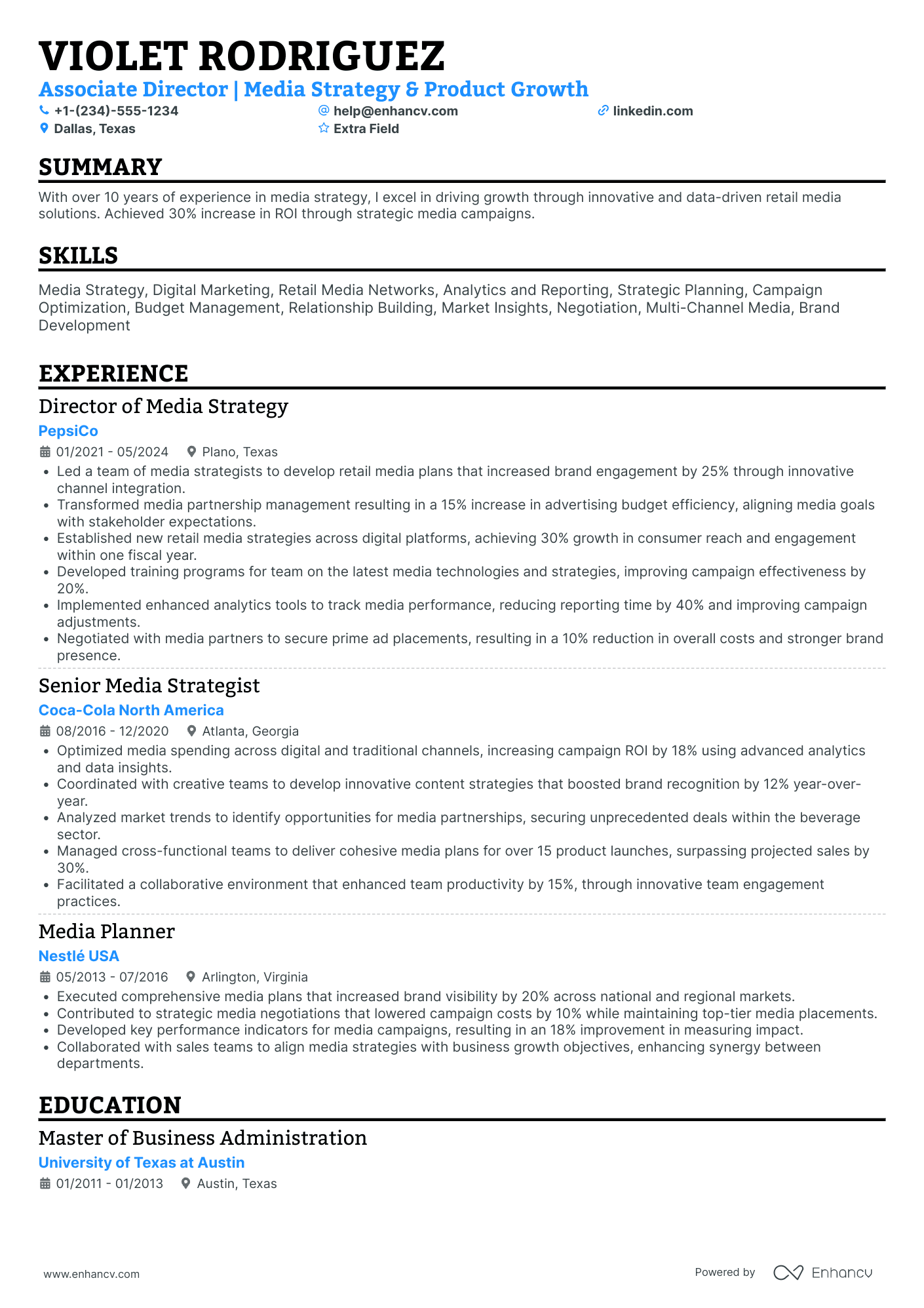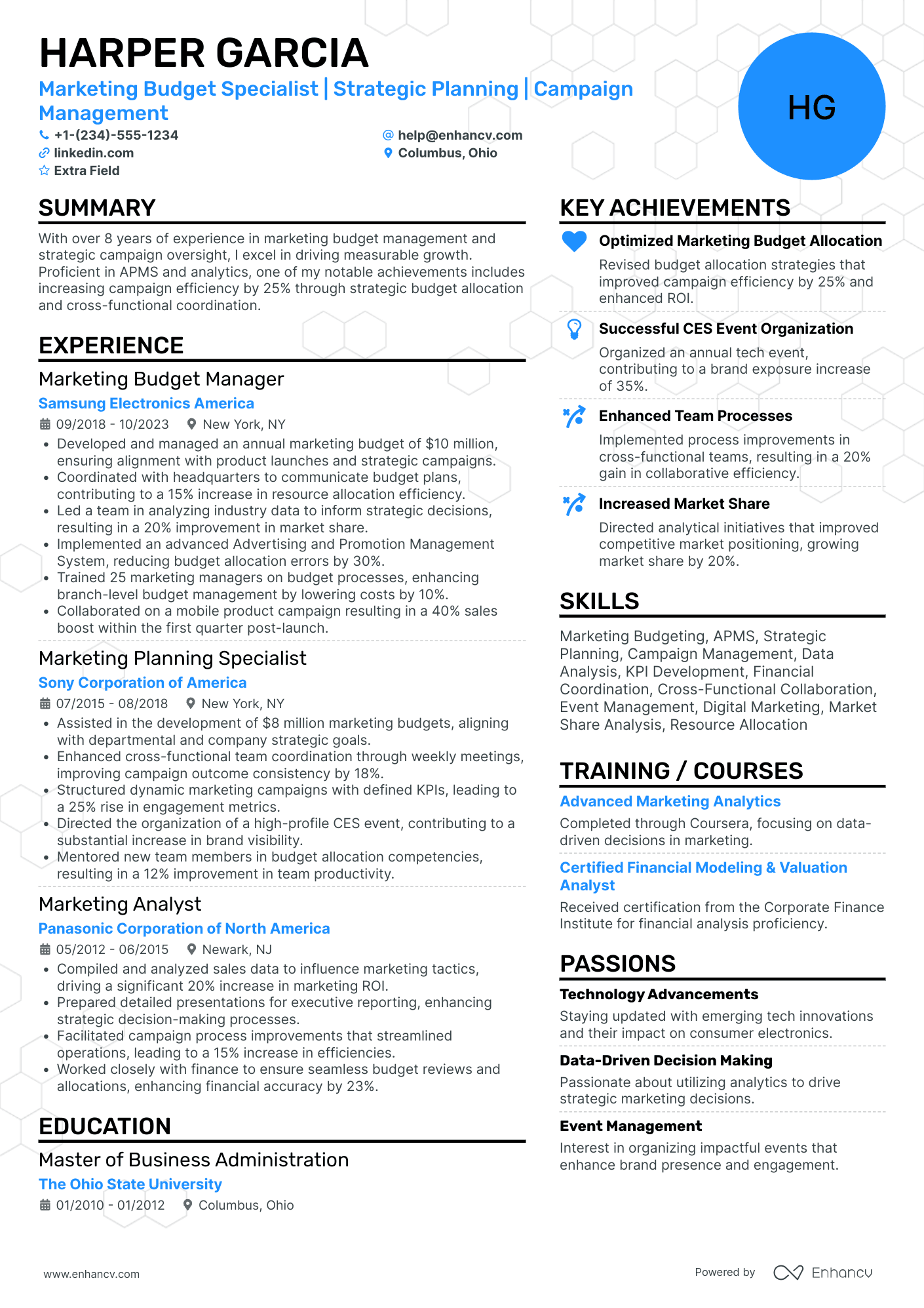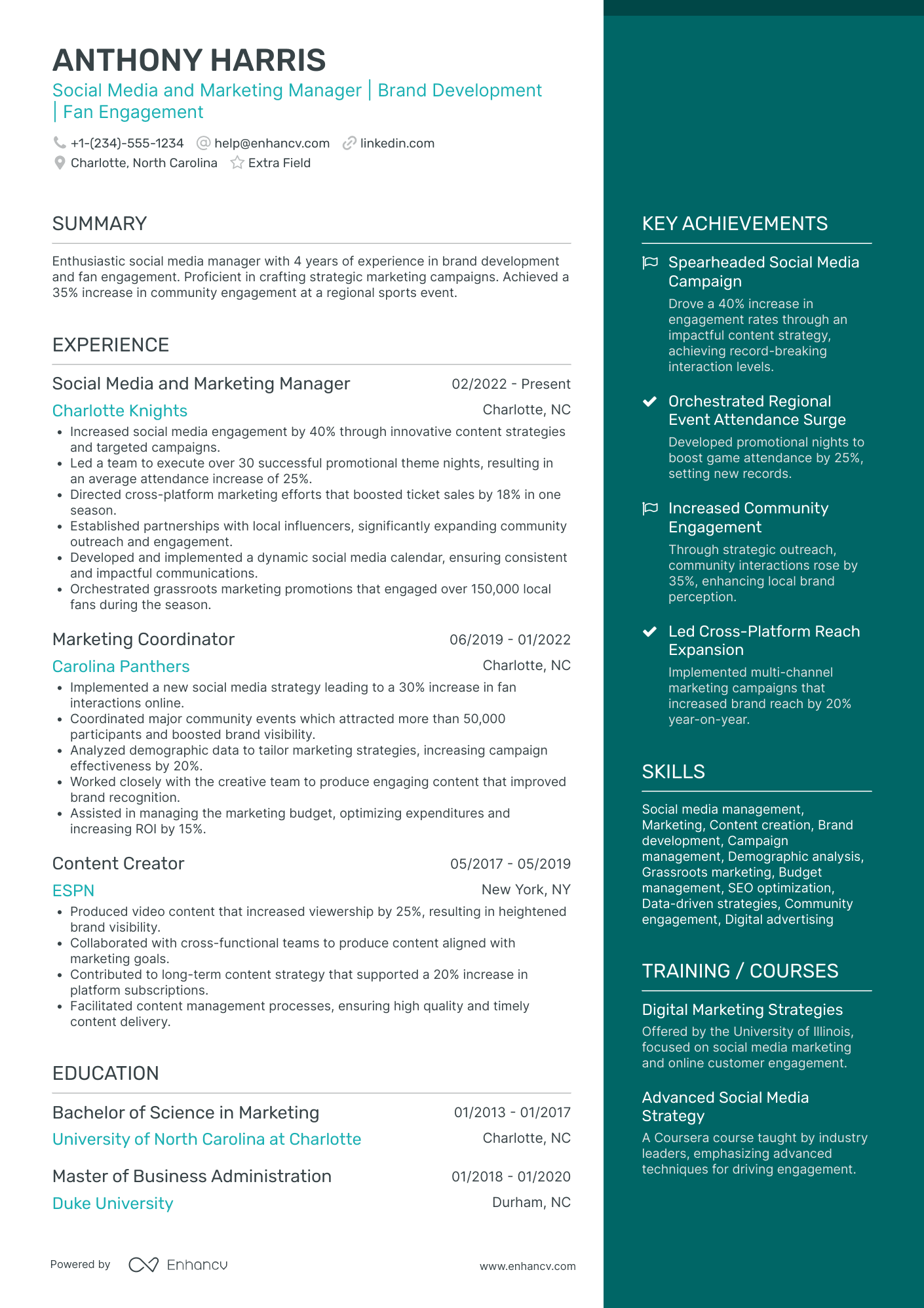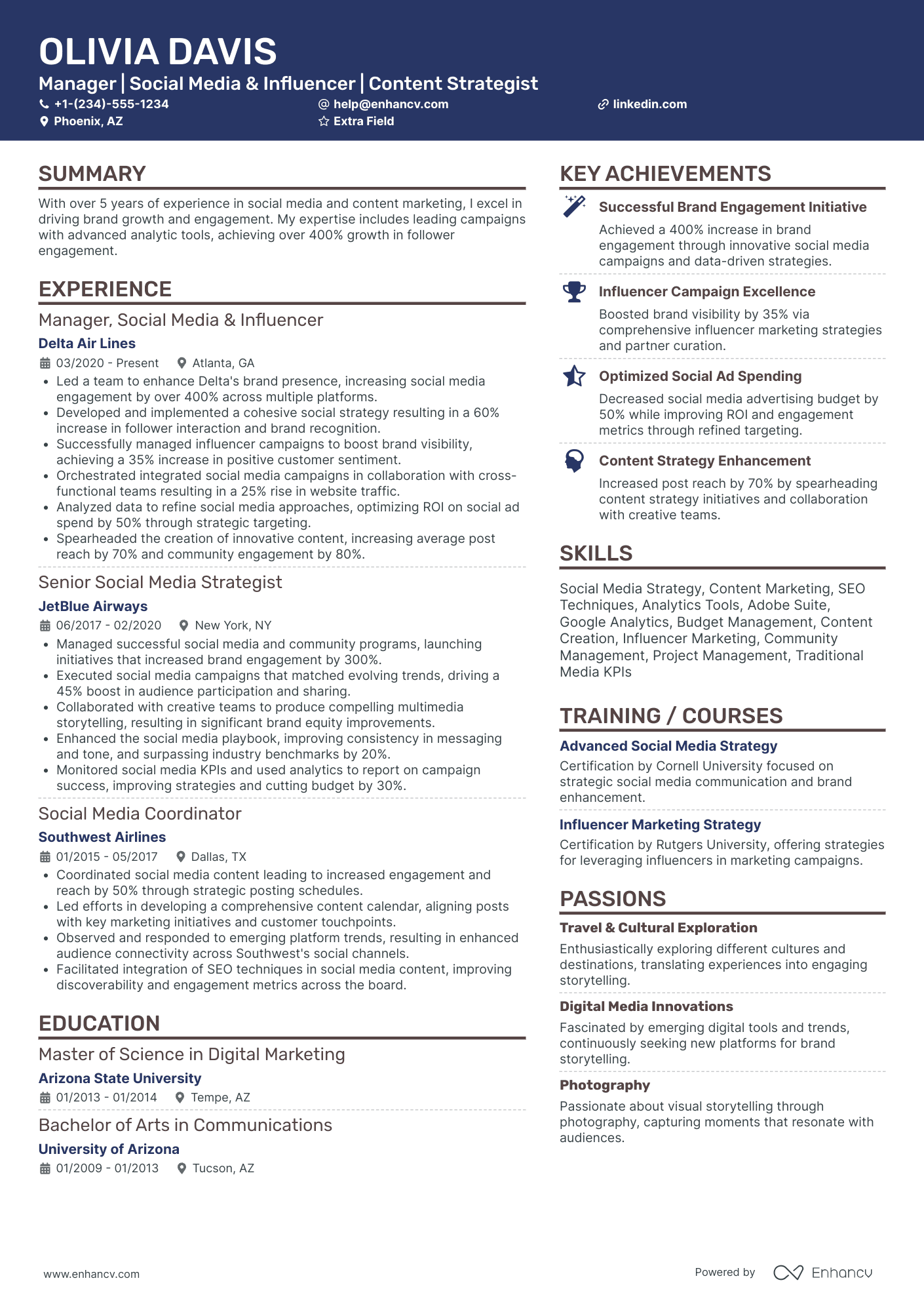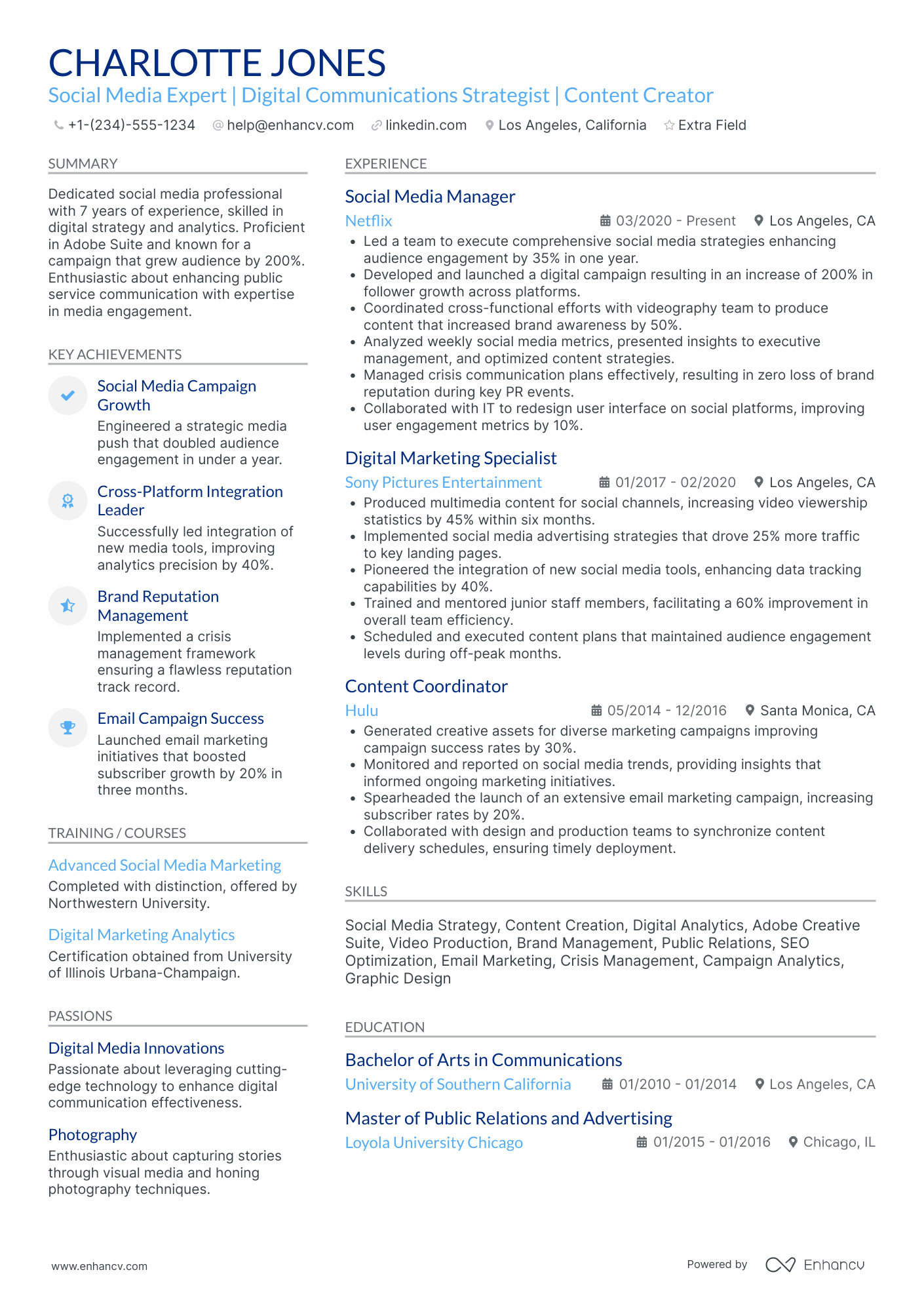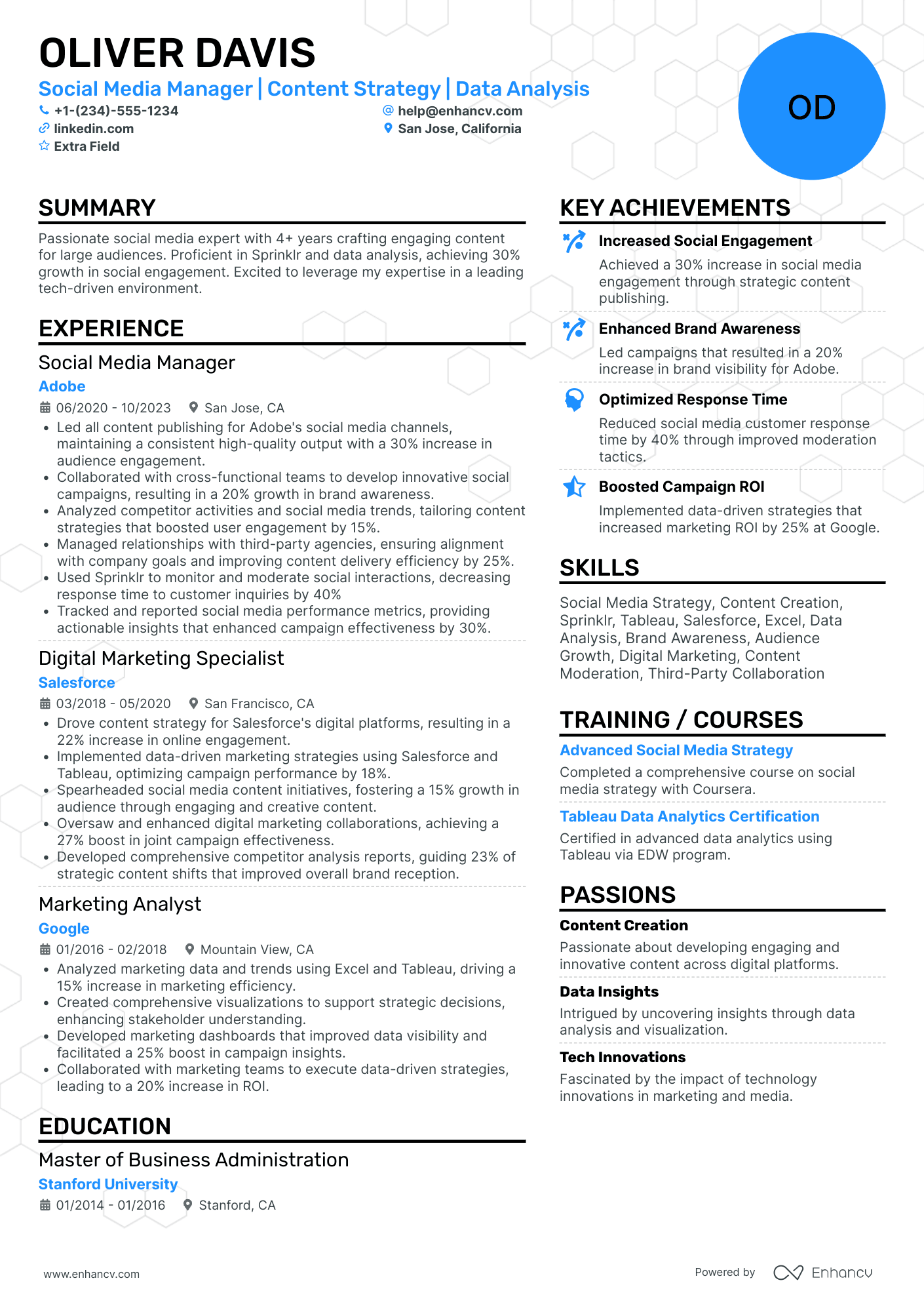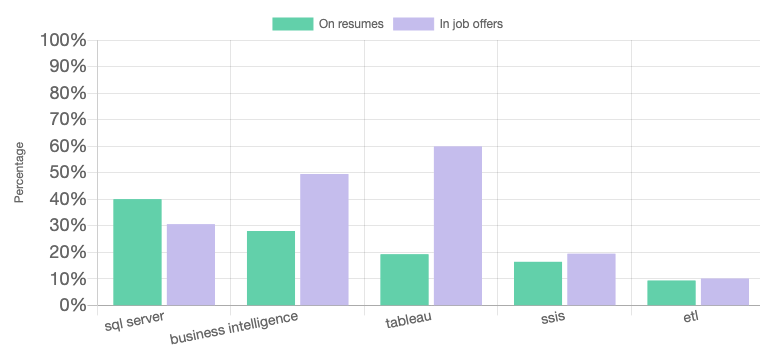Talk to enough people who hire social media specialists and you’ll begin to notice a pattern. There’s a lot of:
“I never hire someone unless they…”
and
“I only hire people who…”
So if you’re having trouble getting hired as a social media specialist, chances are you’re falling into one of these traps.
For example:
In my experience, employers like to hire well-rounded social media candidates, so it’s also important to highlight your writing and design skills. At the same time, pursuing a degree that focuses on writing or communications is key.
Amy Newton, senior social media manager, Ignite Visibility
Luckily for you, we’ve analyzed thousands of social media specialist resume examples and spoken to hiring managers to uncover all of the potential pitfalls for you.
This guide will walk you through all of the steps of making the best social media specialist resume.
This guide will teach you:
- What resume traps you need to avoid
- What hiring manager expect to see in your resume header
- How to write a compelling professional summary
- How to frame your experience around the top hiring criteria for social media specialists
- Which social media marketing skills make the most difference
Looking for related resumes?
- Social Media Coordinator Resume Examples
- Social Media Intern Resume Examples
- Social Media Manager Resume Examples
- Social Media Specialist Resume Examples
- Brand Manager Resume Examples
- PR Specialist Resume Examples
How to write a social media marketing specialist resume
This process starts with choosing your format.
There are two ways to go about this. If you have years of formal work experience as a social media specialist, a reverse-chronological layout is best. This puts your work experience front and center, which is where your greatest accomplishments will be.
On the other hand, if you’re a more junior social media specialist or if most of your work experience is in various side projects, a hybrid layout is best. This emphasizes your skills and the projects you’ve done.
The top social media specialist resume sections
- A resume header with links to social media profiles
- A short professional summary
- An experience section
- A dedicated section for side or passion projects
- A skills section with metrics to back them up
- Certifications
- (sometimes) an education section
You’re probably underestimating the importance of your resume header
Here’s the first trap that’s easy to fall into. Leave your personal and professional profile links off your resume header and you can go straight to the reject pile.
Aspiring social media marketers must include their professional and personal social networking links on their resume. A potential employer will find them anyway, so including them shows savvy and initiative.
Damien Basile, founder of an eponymous digital media agency
This advice came up over and over again when talking to people who hire social media specialists, so we can’t emphasize it enough.
Your resume header is also a great place to include one or two key certifications you might have (if you have more than that you can put them in their own section). Here are two examples to show what this looks like in practice:
Just adding social media links, like your LinkedIn profile, and certifications makes a huge impact on the hiring managers reading your resume.
Show you can write and tell your story in your professional summary
What better way to show off your ability to tell a compelling story in just a few lines than in your own professional summary? Hiring managers expect social media specialists to be talented copywriters, so this is your chance to show off.
Keep it concise and explain
When you’re working across different marketing disciplines, you’ll naturally gravitate to one in particular that appeals to you. It will probably … take up most of your time and be the thing that causes you the most stress—but the most excitement too.
Lauren Mallett, head of social media, FireCask
So make it clear where your passion and skills lay and what results you can get with them.
The problem with the second example is that it’s vague (clearly not tailored for a single position), and uses the first person. Both of these make summaries less effective.
How should you frame your social media marketing specialist experience?
When it comes to including your work experience, there are more pitfalls to look out for.
Mike Hudack, [co-founder] of blip.tv, often says he only hires people if they have a side project they feel passionately about. He wants all hires to be innovative and entrepreneurial. I like that approach.
Soraya Darabi, General Partner at Trailmix Ventures
Whether you’re talking about a side project or not, hiring managers want to see the same elements:
- Show you can get results.
- Show you can come up with innovative strategies.
- Show you can work independently.
Throughout, be specific about what you did and what the results were. Anyone can “manage” social media, companies are looking to hire someone who can bring value from it.
- •Managed social media campaigns
- •Developed a strategy which successfully increased local adoption rates
- •Responsible for managing the social media team.
This experience hits those 3 key points one after the other. It shows independence, creativity, and results. Now have a look at the same experience but expressed differently:
- •Developed new persona strategy while resulted in a 46% reduction of follower acquisition costs and a 35% boost in engagement.
- •Created the #adopttodayVA campaign, boosting adoption rates at local shelters by 21% in 6 months.
- •Rose from social media intern to running overall social media strategy within 2 years, managing a team of 4.
However, there are also some pitfalls when it comes to including your social media pages.
Don't include your follower numbers, ratio or "influence" score. A potential employer will find that out when they search your social profiles
Damien Basile, founder of an eponymous digital media agency
In other words, don’t try to BS or fluff your way into a job. Trust that the hiring manager or social media manager knows enough to see through it.
How to get hired as a social media specialist with no experience
Okay, all of that sounds great but what if you’ve never worked as a social media specialist?
Remember above when Mike Hudack mentioned not hiring anyone without a passion project? Good news is you don’t need a formal social media job to have that. In fact, you can do three key things without any work experience:
- Get certifications (ideas on which ones in the section below)
- Start a project, it could be a blog, podcast, instagram, etc.
- Use that project to try out ideas, gain skills, and show you’re a self starter with a passion for social media marketing
A successful side project and a few key certifications under your belt will make you a fantastic hire.
Include your passion projects. This is what sets you apart and tells your story.
Kimberly Aguilera, Partner, Recruiter at Tangerine
Does your social media specialist resume need an education section?"?
In short, no. To be clear, a degree in marketing, business, communication, or something similar doesn’t hurt. But Beth Cooper clearly explains why a degree isn’t a requirement:
This field changes so quickly. If you graduated with a degree years ago, the info is already out of date.
Beth Cooper, director of marketing and social media for KNB Communications.
It’s that simple. A degree can show you have management, writing, or analytical skills that will be valuable in a social media position, but it’s generally going to be a “nice to have.”
If you’re a recent graduate, you can add some details about what you learned or accomplished in a style similar to your work experience. Otherwise, just mentioning your degree is enough.
Best social media marketing specialist skills to include
First thing to do, before creating a resume skill section, is to understand the role you’re applying for. Is it a social media manager role? An internship? Is it for a B2B or B2C business? Will you be expected to independently create strategies or execute strategies created by someone else?
All of these questions will determine the social media marketing skills you should include.
If you’re applying for a managerial role, emphasize independence, strategy development, and team management. If you’re applying for a more junior role, show that you can execute strategies well.
Here are some soft skill that are good to have, and the technical skills you will need to do your job.
11 social media marketing specialist resume skills
- Team management
- Strategy development
- Community management
- Communication
- Organization
- Creativity
- Crisis management
- Writing
- Curiosity
- Independence
- Analysis
8 social media marketing Specialist Resume Technical Skills
- Google analytics
- Facebook ads
- Google ads
- LinkedIn ads
- Email marketing
- Photoshop
- Buffer
- Zapier
How to include your certifications on your resume
Certifications are one of the most powerful tools you have as a job applicant in social media. Many of them are free and they allow you to show some level of knowledge in an area without any job experience necessary.
So, if you spot a job opportunity which wants you to be familiar with Twitter marketing, just go out and get certified.
Besides that, certifications show that you go above and beyond, are a self-motivated learner, and work to develop new skills.
Top 5 social media specialist certifications
- Hootsuite’s Social Marketing Training
- Twitter Flight School’s Marketing Leadership Course
- LinkedIn Learning’s social media marketing Courses
- Boot Camp Digital’s Social Media Certification
- Google Analytics Academy
We used big data to get you critical insights
We used AI to analyze thousands of social media specialist resumes to pull critical insights for you to use. Below, you can see which skills are the most common amongst social media specialist resumes and which are most in demand by companies looking to hire them.
What are the tricks for the best social media specialist resume?
- Choose a reverse-chronological layout if you’re more experienced, a hybrid layout otherwise.
- Include social media links and certifications in your header.
- Make sure your summary focuses on explaining how you can bring value in the role you’re applying for.
- Use your experience to show you can get results, come up with innovative strategies, and work independently.
- If you don’t have any experience, use side projects and certifications to show your qualifications.
- Tailor your skills to the type of position you’re applying for.
Social Media Marketing resume examples
By Experience
Junior Social Media Marketing Specialist
Senior Social Media Marketing Manager
Head of Social Media Marketing
By Role
